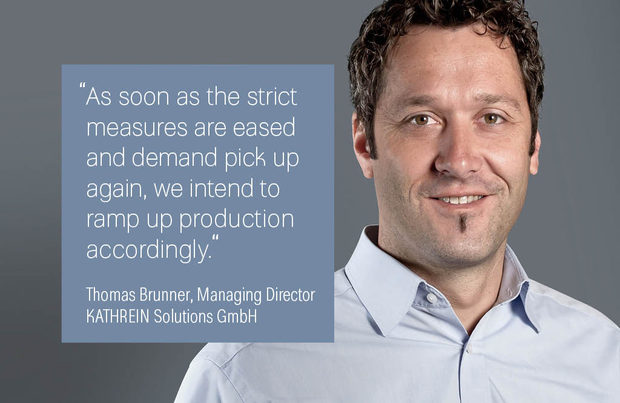Pandemic is No Show Stopper for Digital Transformation

Kathrein Solutions does not see new projects until 2021 – but order books are full!
The spread of Corona delays and interrupts global supply chains. Nearly every industry sector is affected. The automotive industry is particularly severely affected by this development: in addition to the tasks of e-mobility and the implementation of new production and logistics concepts, there is now a massive brake on market demand.
In March 2020, around 288,000 passenger cars were produced in Germany. This is around 37 percent less than in March 2019, and almost all manufacturers have currently stopped production.
What effects does this development have on technology suppliers like Kathrein Solutions? In an interview with RFID & Wireless IoT Global, Managing Director Thomas Brunner provides insights and assessments.
Mr. Brunner, how is the current situation at Kathrein Solutions?
We had already set up a crisis management team in March and started to organize emergency staffing and home office solutions. These early measures ensured that we had no delays in internal work processes and were fully operational. Currently, the emergency staff consists of 15 employees while 17 colleagues work from home.
The hardware production at Kathrein Sachsen GmbH has formed its own crisis management team, and has also been organized to a larger extent in home office. With a core staff and strict adherence to hygiene guidelines and distance regulations, production continues to run normally – however, output has been reduced by approximately 30 percent.
Our order books are filled for six months in full operation. Our inventories also remain well stocked and maintaining production is important to ensure that we can continue to supply large projects. However, production volume is generally declining due to the current lower demand. As soon as the strict measures are eased and demand picks up again, we intend to ramp up production accordingly.
How do you assess the impact on the economic situation?
Many of our major customers from the automotive sector – OEMs and suppliers – have shut down production in a controlled manner and sent some of their employees home. As soon as the government's measures take effect, production is to be resumed in a similarly controlled manner. Nevertheless, the impact on the economy is already enormous – and the peak is still to come. For us this means that no new projects will be started. The decision-makers in industry are not focused on new project work at the moment. I am skeptical whether these new projects that we lack can still be made up for in 2020, but I am very optimistic for 2021.
Was it possible to complete the RTLS project at Audi before the shutdown?
From today's perspective, we were very lucky with the schedule for this project. The integration was completed in January. The first major installation was able to go live before the crisis. That would no longer be possible today. Another very comprehensive solution integration was planned in a huge warehouse and distribution center in Italy. This work is now being delayed of course. The commissioning will take place as soon as the crisis subsides.
In your opinion, does the Covid-19 crisis fuel the implementation of automation solutions?
That is certainly true in principle, but not directly. The duration of automation projects average three to six months. We must also not lose sight of the fact that the automotive industry, for example, was already in rough waters before the crisis. Fleet electrification, new logistics concepts, new production strategies and now the severe pandemic. In order to deal with the main challenges, months will pass before strategies are developed and budgets can be invested. Only then will automation start on a broad front!
How global are the difficulties for production?
Everything is interlinked. Already in December 2019 and January 2020, deliveries of components from China were delayed. This immediately led to delays in further intermediate and final production on other continents, which in turn led to new local difficulties for companies.
Does this mean that regional supply chains are becoming more important again?
No, I don't think so. Whether it makes sense to ship components around the globe is ecologically questionable from my personal point of view. But the possibilities of low-cost production in Asia are rated higher than ecological issues. The level of the global supply chain will be maintained after the crisis and is unlikely to be reduced.
A different picture emerges when it comes to the outsourcing of drug production or system-relevant goods such as protective equipment. That was certainly not very far-sighted, and it is now up to politicians to make the right decisions. The situation is different for industry. There, the cost factor is and remains the decisive factor.
Will companies increasingly produce in Germany again in the future?
I do not see this change either. End products for the consumer market will continue to be manufactured in Asia or other low-cost regions after the Corona crisis. These productions will not return to Germany to a large extent. Germany is the country of the machine manufacturers – this will hardly change. For Kathrein Solutions, the situation is different.
Some of our market companions have only a few standard devices and have them produced cost-effectively in Asia. We work with more than 20 different devices and numerous OEM variants. Therefore, a highly flexible and efficient production in Germany makes sense and is the first choice.
In an interview with RFID & Wireless IoT Global, Managing Director Thomas Brunner provides insights and assessments.